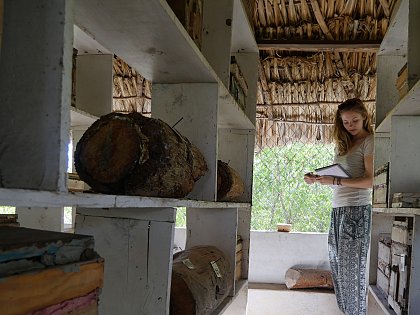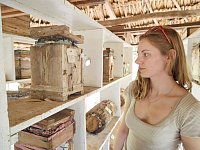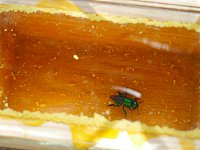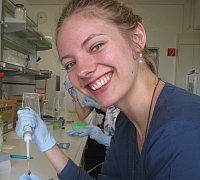Contact
Alice Séguret
phone: +49 (0)345 55 26503
alice.seguret@student.uni-h...
room 6.11
Hoher Weg 8
06120 Halle (Saale)
MSc. Alice Séguret

Research project

Fieldwork in the Yucatán peninsula (Mexico)
I am a third year PhD candidate working on a DFG funded research project under the supervision of Prof. Robert Paxton, in collaboration with universities in Mexico, The Netherlands, Switzerland and Germany.
Currently, I am investigating the mechanisms underlying the trade-off between fecundity and longevity in the orchid bee Euglossa viridissima. Typically, individuals have limited resources at their disposal, which they must allocate to both self-maintenance and reproduction, giving rise to a trade-off between longevity and fecundity. Eusocial insects constitute a notable exception to this rule, as queens exhibit long lifespans compared to workers, and also produce most of the colony’s offspring, suggesting a link between the evolution of sociality and the reversal of the longevity/fecundity trade-off. The proximate mechanisms behind this reversal remain poorly understood. The orchid bee, Euglossa viridissima, is a socially polymorphic species, meaning that individuals within a same population can exhibit either social or solitary behaviour. This makes it excellent model system for investigating which proximate mechanisms underlie the reversal of the fecundity/longevity trade-off in social individuals in comparison to their solitary counterparts.

Euglossa viridissima female in her nest box
In order to address this question, I observed and collected samples over two field seasons in the Yucatán Peninsula (Mexico), following a semi-field design whereby females were artificially induced to nest in wooden boxes, but were able to forage in the wild. This work was carried out in collaboration with Dr. Javier Quezada and Fernando Fleites. We experimentally increased foraging effort in a subset of nests by removing provisions from brood cells. We examined the behaviour of different social forms (queen, worker and solitary females) in response to these manipulations, and in comparison to control nests. Individuals were then sampled for subsequent molecular analyses. In particular, I extracted RNA from these individuals for next generation sequencing (NGS) and transcriptome analyses, with the aim of identifying which genes are differentially expressed between social forms. This will allow us to pinpoint candidate genetic pathways involved in the transition from solitary to social living. Hormone titres (JH) and oxidative stress markers were also measured. These data will provide insight into which costs are associated with different tasks (provisioning, brood care) on the physiological and molecular level, thus helping us to understand the proximate mechanisms underlying the longevity/fecundity trade-off.

Molecular work in Halle
This work is part of a collaborative project within an international research unit, So-Long (FOR2281). The So-Long project addresses fundamental questions in evolutionary biology, such as why organisms age, and how the fecundity/longevity trade-off is remoulded in social insects. With a common experimental set-up across a range of taxa, manipulating factors such as food and reproductive investment, the aim is to disentangle their effects in shaping this central life history trade-off.


Research interests
I have a broad range of interests within evolutionary biology and life history theory, particularly the costs of reproduction and various factors affecting longevity. My former research experience includes a year-long research project investigating the costs of viral infection on the reproductive success of the Indian meal moth (University of Exeter, Prof. Mike Boots), an internship studying the costs of dispersal in the brown garden snail, resulting in 2 publications (University of Rennes, Prof. Luc Madec & Dr. Armelle Ansart), and an internship studying behavioural syndromes of the European hamster (University of Strasbourg, Dr. Yves Handrich, Dr. Odile Petit).
CV
2015-present
PhD student, Martin Luther University Halle: "The fecundity/longevity trade-off in an orchid bee at the cusp of sociality"
2014-2015
MSc (second year), University of Strasbourg: Ecophysiology and Ethology. Graduated with distinction ("Mention bien"), ranked 3rd in the class.
2013-2014
MSc (first year), University of Rennes: Behavioural, Functional and Evolutionary Ecology. Graduated with distinction ("Mention trčs bien"), ranked 1st in the class.
2010-2013
BSc, University of Exeter: Conservation Biology and Ecology. Graduated with First Class Honours.
Publications
Facultative social insects can provide insights into the reversal of the longevity/fecundity trade-off across the social insects. Séguret, A., Bernadou, A., Paxton, R.J. (2016) Current Opinion in Insect Science, 16: 95-103.
Dispersal-related traits of the snail Cornu aspersum along an urbanisation gradient: maintenance of mobility across life stages despite high costs. Dahirel, M., Séguret, A., Ansart, A., Madec, L. (2016) Urban Ecosystems, 19(4): 1847-1859.
Context dependence of the olfactory perceptual range in the generalist land snail Cornu aspersum. Dahirel, M., Cholé, H., Séguret, A., Madec, L., Ansart, A. (2015) Canadian Journal of Zoology, 93(8): 665-669.
Conferences
August 2018 - II Joint Congress on Evolutionary Biology, Montpellier, France. Poster presentation: "Proximate mechanisms behind the reversal of the fecundity/longevity trade-off in a facultative eusocial orchid bee", A. Séguret, F. Fleites-Ayil, E. Stolle, A. Buttstedt, K. Hartfelder, A. Soro, J.J.G. Quezada-Euán, R.J. Paxton.
August 2018 - IUSSI, Guarujá, Brazil. Poster presentation: "Proximate mechanisms behind the reversal of the fecundity/longevity trade-off in a facultative eusocial orchid bee", A. Séguret, F. Fleites-Ayil, E. Stolle, A. Buttstedt, K. Hartfelder, A. Soro, J.J.G. Quezada-Euán, R.J. Paxton.
March 2018 - DZG research meeting, Freiburg, Germany. Oral presentation: "How the queen can afford to have it all: proximate mechanisms behind the reversal of the fecundity/longevity trade-off in a socially polymorphic orchid bee", A. Séguret, F. Fleites-Ayil, E. Stolle, A. Buttstedt, K. Hartfelder, A. Soro, J.J.G. Quezada-Euán, R.J. Paxton.
August 2017 - ESEB, Groningen, Netherlands. Poster presentation: "Mechanisms underlying a life history trade-off: social status and oxidative stress in a facultatively social orchid bee", A. Séguret, F. Fleites-Ayil, A. Buttstedt, J.J.G. Quezada-Euán, R.J. Paxton.
August 2016 - IUSSI European section, Helsinki, Finland. Poster presentation: "Social behaviour and the reversal of a life history trade-off in a facultatively social orchid bee", A. Séguret, F. Fleites-Ayil, J.J.G. Quezada-Euán, R.J. Paxton.
Courses
July 2018 - Minerva School 2018: New Frontiers in Sociobiology and Sociogenomics. University of Haifa
April 2017 - Transcriptome analyses and gene orthologs. University of Münster
October 2016 - Transcriptomics. University of Freiburg
February 2016 - Biocomputing in Linux and Python. University of Münster
February 2016 - Life history modeling. University of Groningen
Collaborators on current project
Prof. Robert Paxton (supervisor), Dr. Javier Quezada-Euán, Msc. Fernando Fleites-Ayil, Dr. Antonella Soro, Dr. Eckart Stolle, Dr. Anja Buttstedt, Prof. Judith Korb, Dr. Karen Meusemann, Prof. Robin Moritz, Prof. Thomas Flatt, Dr. Barbara Feldmeyer, Prof. Susanne Foitzik, Prof. Erich Bornberg-Bauer, Prof. Jürgen Heinze, Prof. Ido Pen, Prof. Franjo Weissing, Dr. Jan Oettler, Dr. Mark Harrison, Dr. Abel Bernadou, Dr. Boris Kramer, Dr. Volker Nehring, Prof. Klaus Hartfelder, Dr. Evelien Jongepier, MSc. Daniel Elsner, MSc. Matteo Negroni, MSc. Marisa Rodrigues, MSc. Denise Aumer, MSc. José Manuel Monroy Kuhn

Collaborating universities within the So-Long research unit
Grants
February 2019 - Travel and accommodation grant, Akyut Kence Evolutionary Biology Conference, Ankara, Turkey
August 2018 - Travel grant, IUSSI International Conference, Guarujá, Brazil
July 2018 - Travel and accommodation grant, Minerva School 2018: Sociobiology and Sociogenomics, HaGoshrim, Israel



